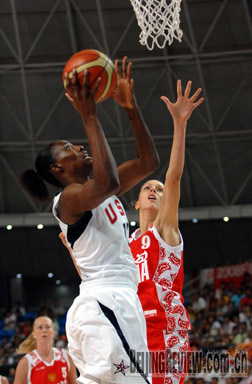|
|

|
|
U.S. VS. RUSSIA: Sylvia Fowles, member of the U.S. women's basketball team, shoots at the basket during an Olympic warm-up tournament held in Zhejiang, China on August 4.(HUANG SHENGANG) |
As usual, the United States and Russia are two of the strongest medal contenders in the Beijing Olympic Games. The two great sports powers both love and encourage sports and are cradles of innumerable sports stars.
The United States, a land of mass sports
The United States is an indisputable sports superpower. Since the first modern Olympiad was held in 1896, the country has never fallen out of the top three in terms of the medal tally. In all the summer Olympics since 1996, the United States has topped the medal table in terms of both the number of gold and the total number of medals.
Sports are an important part of the national tradition of the United States. Americans love sports just as they love steak, cheese and salad. All are indispensable to them. Sports are their favorite pastime. Children are taught that sports are something they must learn from a young age. In a survey, about 70 percent of Americans indicated that they played sports in their spare time, and 60 percent believed that a hobby was equivalent to sport. Americans think sports not only build strong bodies and wills, but also lift spirits and cultivate national pride. Team sports, in particular, can teach young people to work with others, and improve their understanding about life. Hence, Americans, from the president to the general public, are sports zealots. U.S. President George W. Bush has proudly admitted that he is a sports fanatic.
Nevertheless, Americans may not care about the number of Olympic medals they get as much as some other countries do. Many people think the medals are not the most important things for a country competing in the Olympic Games, especially in the post-Cold War era.
Unlike Chinese athletes, who are professionals, American athletes are trained in schools and clubs. Universities are major talent banks for the U.S. Olympic delegation. Take basketball as an example. Americans start playing basketball from a young age. Depending on their age group, young people can compete in elementary schools, in high school basketball tournaments and at college basketball championships. Outstanding players may be spotted by the National Basketball Association (NBA) and become high-paid professionals.
The United States has never fallen out of the top three in the Olympic medal table, except for 1980, when it boycotted the Moscow Olympics for political reasons. After the disintegration of the Soviet Union, the United States lost a strong rival for Olympic medals.
The United States sent a 596-member delegation to Beijing this August, including 310 male athletes and 286 females.
Before leaving for the Beijing Games, Jim Sherr, Chief Executive Officer of the U.S. Olympic Committee, said that their athletes understood that they would face challenges and were prepared psychologically. They would meet the challenges with confidence, he said.
The United States reigns in swimming events. At the Athens Games, American swimmers pocketed 28 medals, including 12 golds, 9 silvers and 7 bronzes. Swimming medals accounted for 22 percent of the total. In the 2007 World Aquatics Championships held in Melbourne, American swimmers won 36 medals, 20 of which were golds, and broke 12 world records. This was the best score of the U.S. swimming squad. In this Olympics, Michael Phelps is no doubt one of the most watched athletes. His goal is to become the first player to win eight Olympic gold medals, in order to break the seven-golds-in-one-Olympic record set by Mark Spitz.
|
